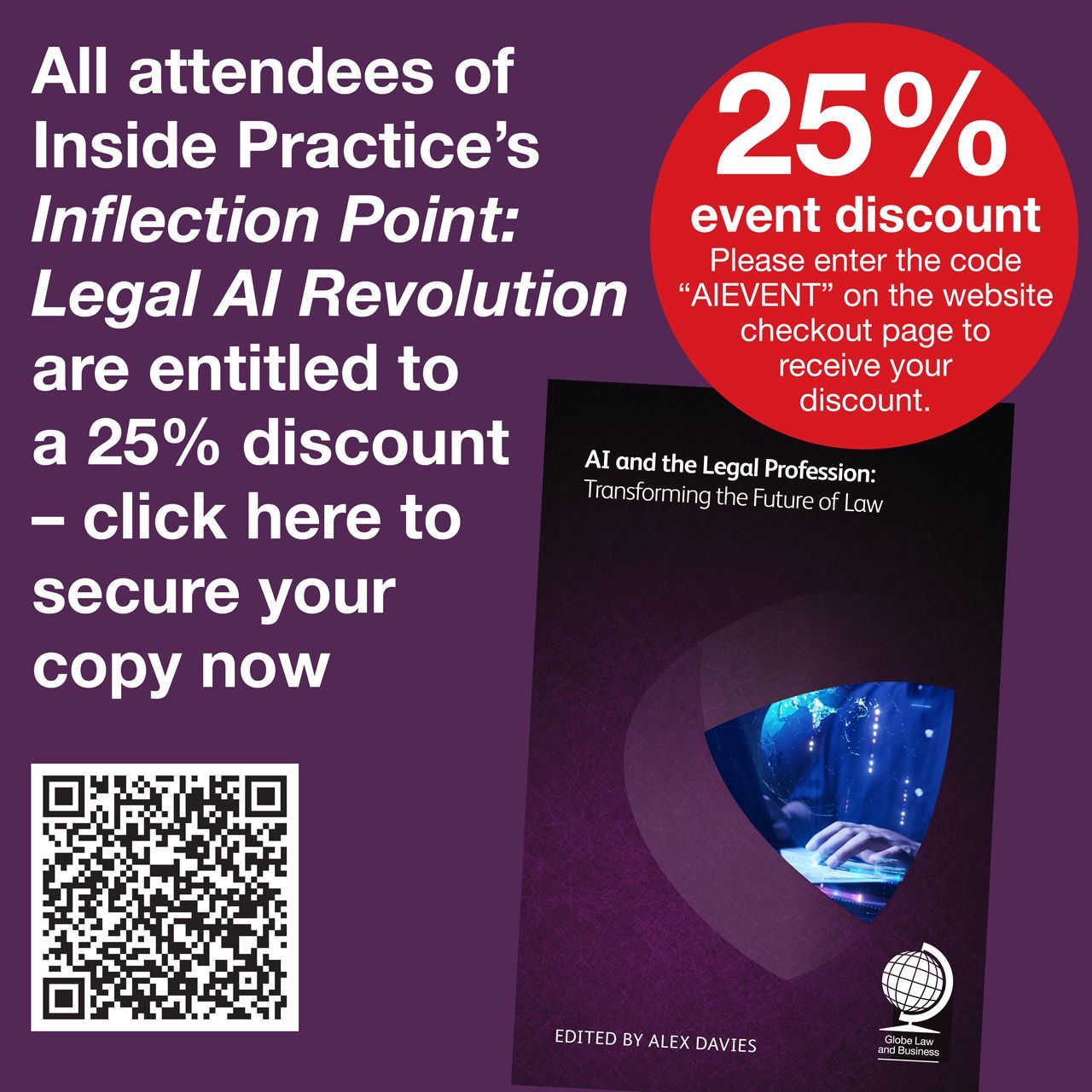Inflection Point:
The Legal AI Revolution
Part 2
ONLINE // SEPT 14 // 2023
Navigating Opportunity and Risk: Exploring the Implications of the Exponential Maturity of AI Tools for the Business and Practice of Law
More
ChatGPT reached more than 100 million monthly users just two months after it was launched, making it the fastest-growing consumer application in history. Generative AI seems to have captured the attention of the legal industry in a manner that we arguably have not seen before.
The hype and the reality…
Early this year, it would have been safe to assume that most law firms don't yet have plans to actually use generative AI in their legal practice. As we approach the latter parts of this year, to what extent has this changed?
As the dust settles around the recent AI hype cycle, law firm leaders across various firm functions are going to have to begin making decisions and placing their bets – addressing justification in capital investment, the unification of talent and toolsets, the development of use-policy and governance, among many other strategic considerations.
AI’s impact on the global workplace is quickly manifesting itself as a complex confluence of tech, ethics, and law. It will become imperative that practices maintain broad legal expertise in the AI space, remaining up to date on legal and regulatory issues and implementation practices across industry sectors.
However, this is only one side of the challenge that law firms face relative to generative AI. While firms grapple with providing legal and regulatory guidance to clients, they are simultaneously encountering their own operational complexities around incorporating these transformative technologies into their own practices and service delivery models.
Inflection Point: The Legal AI Revolution – Part 2 has been developed to address the convergence of risk and opportunity as we explore strategic considerations for navigating this paradigm shift – shining a light on how law firms are approaching multi-faceted challenges imposed by the maturity of AI tools and the competitive pressures to begin exploring ways to leverage these tools internally.
Most attorneys have no experience using generative AI tools. And with potential dangers ranging from erroneous outputs, algorithmic bias and hallucinations – to IP theft, data leakage and confidentiality concerns, it’s hardly surprising that legal professionals are moving methodically and very carefully before putting their trust in AI-powered tools and platforms.
SUPPORTING PARTNERS
This virtual think tank and forum – taking place on September 14 - will provide attendees with an ideal platform for discussion and debate as we collectively address and explore:
- The business case for AI and the justification for firms to invest in a future that we can’t possibly fully understand – balancing potential benefits and opportunities against significant costs, risk, and other ethical considerations.
- How firms are consolidating expertise and unifying talent to help educate the firm and its clients about the benefits and risks of generative AI – as well as to coordinate various constituencies across the firm who will play key roles in building and supporting these activities.
- Building trust with AI: How firms are approaching governance and use-policy, helping to determine when and how AI tools can be deployed safely and legally - while integrating cross-functional measures to enhance overall security, trust, and understanding.
- The competitive landscape and how the incorporation of AI by non-traditional legal service providers (including the Big Four consultancies) is likely to intensify competitive pressures, potentially disrupting the market dominance of established law firms.
- How your clients are using Generative AI within corporate legal departments – and what they expect from outside counsel when it comes to the application of AI tools (what they want firms to do – and not to do with Gen AI)
Is it feasible to believe that law firms can continue to sell hourly units of human judgment into a future that will inevitably be rife with tech-forward legal startups—not to mention the Big Four consultancies, which are aggressively venturing into legal services buoyed by their AI prowess?
Will the distinctive human elements of legal practice - nuanced judgment, empathy, and negotiation skills, among others - continue to provide traditional law firms with a competitive edge? To what extent might AI's algorithmic efficiency and cost-effectiveness render these aspects less relevant in the future?
The value of emerging AI tools will be defined by the purpose and context of their application. If an increase in investment in AI signals a significant shift in how legal services will be delivered, what are the strategic considerations for traditional law firms navigating this paradigm shift?
Early Bird Registration:
Confirm your place at this event by July 28th and save $50 on your registration.
Use the discount code AIREV2 when placing your order.
SPEAKERS
Anand Upadhye
Tech/Law/Litigation Finance
Founder
Modern Lawyer Strategies
Danielle Benecke
Founder, Baker McKenzie Machine Learning
Baker & McKenzie LLP
David Cunningham
Chief Innovation Officer
Reed Smith
Nicole Bradick
Founder and CEO
Theory and Principle
David Wang
Chief Innovation Officer
Wilson Sonsini Goodrich & Rosati
Ken Crutchfield
Vice President and General Manager of Legal Markets
Wolters Kluwer Legal & Regulatory U.S.
Alison Grounds
eMerge, Managing Partner
Troutman Pepper
Andrew Medeiros
Director of Innovation Solutions
Troutman Pepper
Jessica Kozlov Davis
ICS Director & Ethics Counsel
Troutman Pepper
Christopher Forstner
Partner, Intellectual Property
Troutman Pepper
David Perez
Partner, Firmwide Chair, Business Litigation Practice; Firmwide Co-Chair, Real Estate Litigation
Perkins Coie LLP
Scott Rechtschaffen
Chief Knowledge Officer | Shareholder
Littler Mendelson P.C.
Jacqueline Schafer
Founder and CEO
Clearbrief
Christian Lang
Founder and CEO
Lega Inc.
Natalie Pierce
Partner and Chair of the Employment & Labor Group
Gunderson Dettmer
Ed Walters
Chief Strategy Officer
vLex
Adjunct Professor
Georgetown Law and Cornell Law School
Jason Barnwell
General Manager,Digital Transformation of Corporate, External, and Legal Affairs
Microsoft
Joël Roy
Legal Business Partner
Novartis Innovative Medicines
AGENDA
8:15 AM US CENTRAL
Chairpersons Welcome Remarks
Anand Upadhye
Tech/Law/Litigation Finance
Founder, Modern Lawyer Strategies
8:30 AM US CENTRAL / KEYNOTE
What Does it Mean to be a Lawyer in an AI-Enabled World?
As the dust settles around the recent AI hype cycle, law firm, in-house and other industry leaders are going to have to begin making decisions and placing bets – addressing justification in capital investment, the unification of talent and toolsets, the development of use-policy and governance, among many other strategic considerations.
A few firms are already out in front of the pack – early adopters that had the foresight to begin their AI and tech journeys years ago.
In this opening keynote session, Danielle Benecke (Founder, Baker McKenzie Machine Learning) will begin to unpack the transformational impact of AI on the profession – taking a broad industry perspective that will also intersect and contrast with initiatives at Baker McKenzie – from their Reinvent innovation program to their 2017 AI Task Force, to Baker's Machine Learning Practice of today.
What has been the “North Star” for Baker & McKenzie along their AI journey? What led them to place bets years ago on a coming paradigm shift that is impossible to ignore today? Which instincts of theirs were right, which have been challenged, and what are the big open questions for all of us?
This opening discussion will share a story arc and tech progression that will help us to better understand where we’re at today and the implications for lawyers and law firms in a rapidly evolving AI-enabled world.
Danielle Benecke
Founder, Baker McKenzie Machine Learning
Baker & McKenzie LLP
9:30 AM US CENTRAL / PANEL
The Business Case for AI: Justifying Investment in a Future We Don’t Quite Yet Understand
Most would agree that at some point, AI will significantly impact if not transform the delivery of legal services – ranging from the automation of routine tasks to complex decision-making and risk analysis. As a result of these anticipated changes, law firms are incentivized to invest strategically in AI technologies today, both as a competitive advantage and as a means to improve efficiency and reduce costs. Early adoption may offer opportunities to lead in the market, as early adopters of AI could feasibly deliver more effective and efficient services than their slower-to-adopt counterparts.
- What are the implications around capital investment in tools and teams that in the short term may actually create efficiencies that reduce billable time and impact profitability adversely?
- How might competitive pressures or client requirements factor into the equation?
- How are firms investing in developing a level of competence among lawyers and allied professionals who must be able to ask the right questions, evaluate emerging products, and be able to identify where and how AI tools might benefit a process, improve outcomes or boost productivity?
This opening panel discussion will address the justification for law firms to invest in a future we can’t possibly yet fully understand – balancing potential benefits and opportunities against significant costs, risk and other ethical considerations.
It may feel as if we are venturing into the (AI) abyss, standing on the precipice of a period likely to be characterized by rapid change. Of course, clients will look to firms for guidance, transparency, and collaboration. What’s the risk to your firm in not making considerable investments in the AI space? While the cost and resource demands around investment in AI may be high, the long-term risks of not investing may be higher.
David Cunningham
Chief Innovation Officer
Reed Smith
David Wang
Chief Innovation Officer
Wilson Sonsini Goodrich & Rosati
Nicole Bradick
Founder and CEO
Theory and Principle
Ken Crutchfield
Vice President and General Manager of Legal Markets
Wolters Kluwer Legal & Regulatory U.S.
11:00 AM US CENTRAL / CASE STUDY
Consolidating Your Firm’s AI Expertise: Amplifying and Unifying Talent and Resources Capable of Identifying and Recognizing Opportunity and Risk
AI’s impact on the global workplace is quickly manifesting itself as a complex confluence of tech, ethics, and law. It will become imperative that practices maintain broad legal expertise in the AI space, remaining up to date on legal and regulatory issues and implementation practices across industry sectors.
Yet this is only one side of the challenge that law firms face relative to generative AI. While firms grapple with providing legal and regulatory guidance to clients, they are simultaneously encountering their own operational complexities around incorporating these transformative technologies into their own practices.
How are law firms approaching the multi-faceted challenges imposed by the exponential maturity of AI tools and the competitive pressures to begin exploring ways to leverage these tools internally?
In an effort to capitalize on the work they are already doing and the broad legal expertise the firm has in the AI space, Troutman Pepper recently launched their Generative AI Task Force to help educate the firm and its clients about the benefits and risks of generative AI – as well as to coordinate the various constituencies across the firm who will play a role in building and supporting these activities.
This illuminating panel discussion will shed some light on how Troutman Pepper is approaching the task of consolidating and leveraging the collective skills and expertise of the firm’s attorneys and other allied professionals from across the firm to pilot, vet, guide, and educate around both the internal and operational elements – as well as external, client-facing and advisory challenges and opportunities that generative AI brings to bear.
Alison Grounds
eMerge, Managing Partner
Troutman Pepper
Jessica Kozlov Davis
ICS Director & Ethics Counsel
Troutman Pepper
Christopher Forstner
Partner, Intellectual Property
Troutman Pepper
Andrew Medeiros
Director of Innovation Solutions
Troutman Pepper
12:10 PM US CENTRAL / TECH DEMO
DraftWise AI -
Data-Driven Decisions: Exploring a New Era of Contracts & Negotiations
12:30 PM US CENTRAL / PANEL
Can We Trust AI?: Building Competence, Momentum and Guardrails (Policy) - as Law Firms Aspire to Use AI Tools Safely (and legally)
The assumption that law firms are reluctant to use generative AI in their practice is being tested. Generative AI, as exciting as it may be, does not comprehend the meaning of its own output. While these models can generate impressive, human-like text, it's essential to remember that their output doesn't reflect understanding or intention. It's merely the result of sophisticated pattern recognition and prediction relative to vast amounts of data that they have been trained on. Hence, if firms are intent on leveraging these tools themselves, then they must establish guardrails and use policy to mitigate risk as the legal industry begins to shift with respect to how services are delivered.
Law firms aiming to utilize AI tools face challenges in merging technological understanding with legal and ethical considerations, bridging the gap between risk, security, and tech innovation. As business leaders and lawyers wrestle with the tech aspects, tech professionals will likely lack the necessary legal insights. The key challenge lies in harmonizing these cross-functional areas to bolster security, trust, and comprehension.
This lively discussion will not only address how firms are approaching governance and use-policy, helping to determine when and how AI tools can be deployed – but will also consider critical change management and leadership challenges that must be confronted in order to successfully navigate the complexities around the deployment of generative AI tools - while integrating cross-functional measures to enhance overall security, trust and understanding.
David Perez
Partner, Firmwide Chair, Business Litigation Practice; Firmwide Co-Chair, Real Estate Litigation
Perkins Coie LLP
Scott Rechtschaffen
Chief Knowledge Officer | Shareholder
Littler Mendelson P.C.
Jacqueline Schafer
Founder and CEO
Clearbrief
Christian Lang
Founder and CEO
Lega Inc.
Natalie Pierce
Partner and Chair of the Employment & Labor Group
Gunderson Dettmer
1:40 PM US CENTRAL / TECH DEMO
Office & Dragons: Managing Revisions to Hundreds of Documents Seamlessly
2:00 PM US CENTRAL / PANEL
Creative AI in Corporate Legal Departments
For all of the talk about how law firms use artificial intelligence, there are actually many different in-house uses for AI as well. How are corporate legal departments using AI in practice? Do they prefer to buy or build tools? How do they use their proprietary data, about themselves and about their law firms? What safeguards and best practices do they expect from outside counsel using AI tools? This panel of leaders from corporate legal departments break down the potential, and the hype, of the next generation of AI tools.
Ed Walters
Chief Strategy Officer
vLex
Adjunct Professor
Georgetown Law and Cornell Law School
Jason Barnwell
General Manager,Digital Transformation of Corporate, External, and Legal Affairs
Microsoft
Joël Roy
Legal Business Partner
Novartis Innovative Medicines
Jenn McCarron
Board Member
CLOC
Director of Legal Operations & Technology
Netflix
3:30 PM US CENTRAL / PANEL
The Future of Law Firms in the Age of Generative AI: Reimagining the Law Firm Value Proposition
Whose time is it to shine? Given the potential for generative AI to automate a significant portion of routine legal tasks, let’s pose the question – how might AI fundamentally redefine the conventional law firm structure, billing model, and value proposition?
Is it feasible to believe that law firms can simply continue to sell hourly units of human judgement into a future that will inevitably be rife with tech-forward legal startups—not to mention the Big Four consultancies, which are aggressively venturing into legal services buoyed by their AI prowess?
This discussion will posit whether the distinctive human elements of legal practice - nuanced judgment, empathy, negotiation skills, among others - can continue to provide traditional law firms with a competitive edge, or if the algorithmic efficiency and cost-effectiveness of AI will render these aspects less relevant in the future.
Perhaps it boils down to a “Run the Company vs. Bet the Company” distinction.
If AI is going to disrupt and restructure the industry – arguably crashing the “Run the Company” work that law firms have long enjoyed, who is best positioned to pick up the low-level/high volume legal work at scale?
This discussion will critically examine the long-term viability of the traditional law firm model amidst the rapid emergence and proliferation of generative Artificial Intelligence (AI) technologies, and the concurrent rise of new players in the legal services market – and will further scrutinize how the incorporation of AI technologies by non-traditional legal service providers, including the Big Four consultancies, may intensify competitive pressures, potentially disrupting the market dominance of established law firms.
To what extent will traditional law firms be forced to reimagine their value proposition in the not-too-distant future? And what are the strategic considerations for traditional law firms navigating this paradigm shift?
Anand Upadhye
Tech/Law/Litigation Finance
Founder, Modern Lawyer Strategies
Jennifer Leonard
CEO
Creative Lawyers
Jordan Furlong
Principal
Law21
Jae Um
Founder and Executive Director
Six Parsecs
4:30 PM US CENTRAL
Chairpersons Closing Remarks
Anand Upadhye
Tech/Law/Litigation Finance
Founder,
Modern Lawyer Strategies
Discussion Points at Inflection Point: The Legal AI Revolution – PART 2

This full-day series of panel discussion/think tanks will:
ROI: What are the implications around capital investment in tools and teams that in the short term may create efficiencies that reduce billable time and impact profitability adversely? How might competitive pressures or client requirements factor into the equation?
Button
This full-day series of panel discussion/think tanks will:
Education/Professional Development: It would be unwise for law firms to advise on tech that they don’t themselves understand and use. How are firms building a level of competence among lawyers and allied professionals who must be able to ask the right questions, evaluate emerging products, and be able to identify where and how AI tools might benefit a process, improve outcomes or boost productivity?
Button
This full-day series of panel discussion/think tanks will:
Leadership and strategy: Who are your firm’s experts and change agents? Which functions within the firm will lead projects, create the vision and develop and execute on strategy?
Button
Slide title
Competition and economics: AI will challenge existing business models and create new opportunities to expand and productize your knowledge assets. How prepared is your firm to be able to pivot and always be innovating as new revenue streams and opportunities to provide higher value to clients emerge?
Button
Slide title
Examine how AI can be used to elevate law firm intelligence functions, enabling better data-driven business decisions – and how to train tPatience and due diligence: Making sure that today’s investment in emerging AI tools does not become sunk costs at the hands of tomorrow’s rapid advances. hese models on our firm’s own data sets for more refined results.
Button
Slide title
Client Expectations: What impact should our clients expect? Clients will look to firms for guidance, transparency, and collaboration. What’s the risk to your firm in not making considerable investments in the AI space?
Button
Slide title
What firms can be doing today, cross-functionally, to bridge gaps between risk management, tech and innovation.
Button
Slide title
Write your captThe critical skillsets necessary to move forward with generative AI while assessing where firms are today along this journey. ion here
Button
Slide title
Write your capEfforts to enhance and expand upon firm-wide knowledge and understanding around how AI tools work, how they’re audited and maintained, and where things could potentially go awry. tion here
Button
Slide title
critical change management and leadership challenges that must be confronted in order to successfully navigate the complexities around the deployment of generative AI tools - while integrating cross-functional measures to enhance overall security, trust and understanding.
Button
Slide title
Under what circumstances will firms use AI? Exploring the importance of developing and rolling out a Use-Policy for AI tools and tech: How have firms approached the development of an evolutionary, living document to guide internal use and employee engagement with AI – making it clear when we can and cannot use these tools in practice?
Button
REGISTRATION
Confirm your place at this event by July 28th and save $50 on your registration.
Use the discount code AIREV2 when placing your order.
Additional team rates are available on request; please contact us for more information
This is a paragraph. Writing in paragraphs lets visitors find what they are looking for quickly and easily.
This is a paragraph. Writing in paragraphs lets visitors find what they are looking for quickly and easily.
Individual Registration
Access to
The Legal AI Revolution
for one individual
$245
($195 through 07/28)
Contact Us
We will get back to you as soon as possible.
Please try again later.
Contact Us
We will get back to you as soon as possible.
Please try again later.
Contact Us
We will get back to you as soon as possible.
Please try again later.
Contact Us
We will get back to you as soon as possible.
Please try again later.
SPONSORSHIP
Inflection Point: The Legal AI Revolution Part 2 will be limited to 5 Sponsors / Supporting Partners. Each supporting partner of this virtual conference will be able to take advantage of:
- Product/Thought-Leadership Showcase
- Branding Opportunities
- 10 Complimentary Passes
- Delegate Attendee List
Inflection Point: The Legal AI Revolution Part 2 promises to be a thought-provoking examination of where we are today, as we discuss and debate the potential benefits and risks associated with the use of maturing AI tools within the legal profession— and the opportunities for leveraging the power of these tools to add value and transform the way we work for both law firms and the clients we serve.
For more information on how you can partner with us on this event please contact:
Kevin Klein
VP Content & Programming
Inside Practice


























